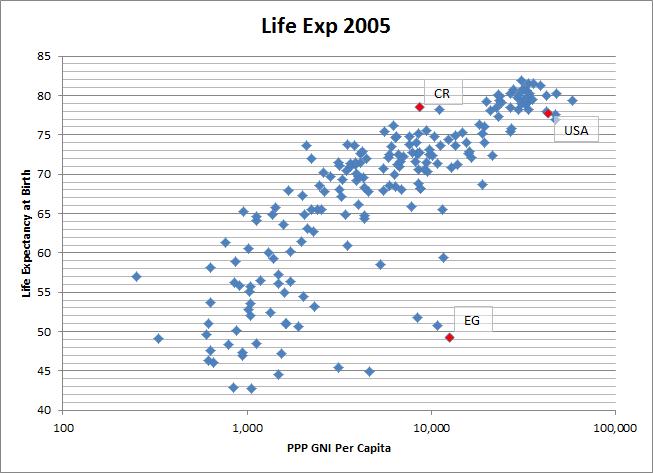In 2009 the New Zealand government changed the mandate of its aid programme, giving it a core focus on economic development. The move put the New Zealand aid programme in good company: JICA, the World Bank and the DANIDA all refer to economic development in their mandates, while AusAID and USAID afford it prominence.
And yet in parts of the New Zealand development community the change in mandate was seen as major mistake.
Was the change a positive one for the New Zealand aid programme? And, more generally, should aid agencies focus on economic development? In my next two blog posts I will try and answer these questions. I’ll do this in two parts. GDP/capita is hardly an end of its own, so today I’ll investigate whether economic development brings benefits in areas that really matter, focusing on health and poverty.
Then next week I’ll examine whether aid is an effective tool for bringing about economic development. I’ll do this is because, even if economic development is a worthwhile objective, there’s still not much point focusing aid on it unless aid actually brings it about.
Economic Development and Health
As a sufferer of a chronic illness I can say from experience that good health is an important element of a meaningful and happy life (my beliefs here are confirmed by survey evidence showing health to be a central aspect of reported life satisfaction). So if economic development can be shown to bring good health, this would be a significant mark in its favour.
In the chart below I’ve plotted (using 2005 data from the World Bank World Development Indicators) PPP adjusted GNI per capita (an indicator of level of economic development — on a log scale on the X axis) and life expectancy at birth (a proxy for health outcomes more generally — on the Y axis). Each dot on the chart represents a country.
Visible in the graph is a strong association between economic development and life expectancy. This association itself isn’t proof that higher GNI causes higher life expectancy (the causal link may, and indeed probably does, in part run in the opposite direction) but the general consensus among development economists is that economic development does lead to better health. Or as Spence and Lewis put it [pdf]: ““We can say with confidence that economic growth improves health.”
The relationship becomes weaker as countries become wealthier (remember the X axis is log scale). Also there’s a lot of variance around the line – as is illustrated by the countries in red. Equatorial Guinea (EG) is wealthier than Costa Rica (CR) yet its life expectancy is 30 years lower. Likewise, the USA is substantially wealthier than Costa Rica, yet its life expectancy is actually slightly lower too. Wealth may lead to health on average but there is a lot of space around that average. Which means that, up to a point, there is a lot that can be done to improve health even in countries with low levels of economic development.
Economic Development and Poverty
Very few people would argue that development work shouldn’t ultimately aim to reduce poverty. Not only is poverty associated worse welfare but living in poverty dramatically reduces opportunity too.
The chart below comes from the Art Kraay paper, ‘When is Growth Pro-Poor?’ Each point on the chart represents a country (over a particular period of years), the X axis shows the country’s rate of economic growth and the Y axis shows the change in poverty levels for the country.
The pattern is clear enough. Higher rates of growth are generally associated with more rapid poverty reduction. As with health, the impact of economic development on poverty is relatively uncontroversial amongst development economists. On average, economic development leads to poverty reduction. There is variance around this average: growth can be more or less pro-poor (and in some, relatively rare, instances can be actively anti-poor), meaning that anyone concerned about poverty needs to also be concerned about inequality too. But, on average, economic development does appear to be a good tool for poverty reduction.
Other Areas
The relationship between economic development and other aspects of development varies. The best available evidence suggests that – subject to diminishing returns – economic development is associated with increased happiness and life satisfaction (which surely ought to be our ultimate yardstick of development), but in other areas, such as the relationship between economic development and those MDG Indicators not associated with health and poverty, the one study that I am aware of [pdf] purports to have found the relationship to be weak.
What Does This All Mean?
Although it’s not everything, in the case of poverty, health and happiness, economic development really does, on average, lead to meaningful improvements in people’s lives. Which means that, if aid can be shown to be an effective tool in promoting economic development, a focus on it would seem justified. Yet at the same time, as the experience of countries like Costa Rica show, relatively low economic development can still be translated into worthwhile improvement. Also, the variance around overall averages means that an excessive focus on economic development, with no attention to distribution might not be a particularly effective tool for promoting development at all.
Next week I’ll look at the relationship between aid and economic development.
[Update: you can now read the second part of my attempt to answer the aid and economic development question here.]
Terence Wood is a PhD student at ANU. Prior to commencing study he worked for the New Zealand government aid programme.







Thanks Peter. That’s an excellent comment! And one which deserves a good reply. I’m stuck with terrible internet access at present, but will try and reply as soon as I can (maybe with a post on poverty and poverty measurement).
Thanks again
Terence
Terence – you’ve summed up some pretty complex issues very succinctly. The link between economic development and poverty is very contentious. A starting point for a clearer understanding of the link should be to recognise that poverty has many dimensions and cannot be simply summed up by per capita income. As Amartya Sen has repeatedly pointed out, people have a range of needs, many of which are essentially non-economic in nature. This of course puts him at odds with many of his fellow economists, who would like to label such non-economic priorities as irrational and for whom a more complex notion of poverty threatens the relevance of empirical studies correlating economic growth and poverty as measured in terms of per capita income.
Economists who take issue with the concept of non-economic priorities may argue that, with money, anything is possible. There is insufficient space here to do justice to this debate. Two examples serve to illustrate that poverty is too complex to allow income levels to serve as a reasonable proxy.
First, two households may have similar levels of income but one may have lower access of essential services such as health care, on which you have focused. This may be for a variety of reasons such as location or social class but the result is the same – the two households are not equal in terms of their level of vulnerability or deprivation – i.e. on their real poverty.
The second example goes to the heart of the problems of using quantitative measures of poverty. It may be easier to track progress of development through levels of per capita income but this index ignores what might at the same time be happening to the distribution of incomes about the average – the point you make towards the end of your blog. Distribution about the average may be greatly increased as a result of growth, and any amount of rhetoric about “trickle down” or “a rising tide lifts all boats” cannot hide the grim reality that, for the losers in a process of economic development, it can be quite literally a matter of life or death. Additionally, we need to bear in mind that, if we see happiness, dignitity or security as objectives rather than simply “poverty reduction”, relative poverty can be as potent a problem as its absolute level. In a society where everyone is poor, there will tend to be less sense of poverty than in a society where there are marked (and potentially increasing) differences.
I look forward to your follow-up piece on aid and economic development.